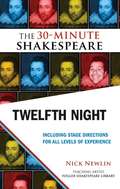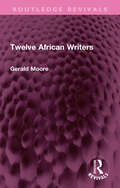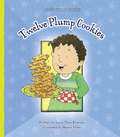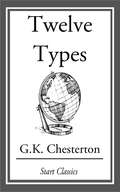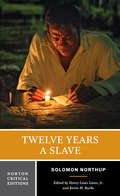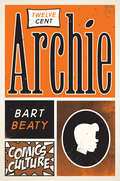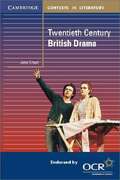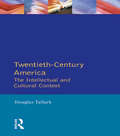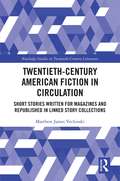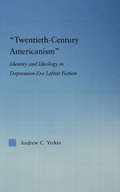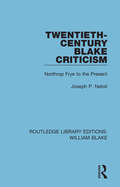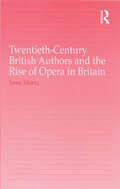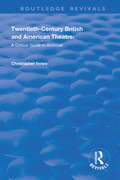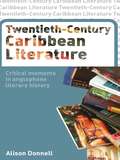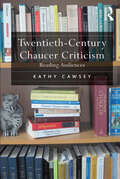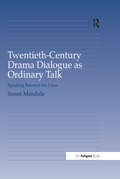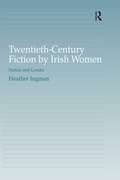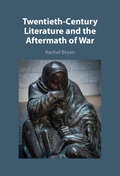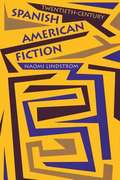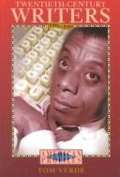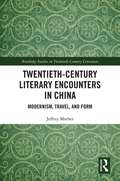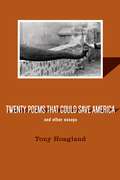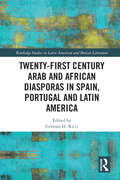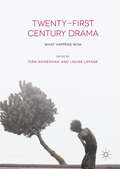- Table View
- List View
Twelfth Night: The 30-Minute Shakespeare
by Nick NewlinPlanning a school or amateur Shakespeare production? The best way to experience the plays is to perform them, but getting started can be a challenge: The complete plays are too long and complex, while scene selections or simplified language are too limited."The 30-Minute Shakespeare" is a new series of abridgements that tell the "story" of each play from start to finish while keeping the beauty of Shakespeare's language intact. Specific stage directions and character suggestions give even inexperienced actors the tools to perform Shakespeare with confidence, understanding, and fun!This cutting of TWELFTH NIGHT, Shakespeare's bittersweet comic masterpiece, consists of three classic scenes. After an extended introductory narration, the action begins with Feste the Fool consoling a mourning Lady Olivia with wit and wordplay. Viola (disguised as a male Cesario) woos Olivia on behalf of Duke Orsino, but Olivia falls for the messenger Viola/Cesario instead. The final scene in Olivia's kitchen gives young actors an easy and specific way to play late-night revelry, as Sir Toby Belch and his friends amuse themselves with the censorious but ultimately hapless Malvolio. One highlight of the production is a group "rap" version of the song "Come Away Death."The edition also includes an essay by editor Nick Newlin on how to produce a Shakespeare play with novice actors, and notes about the original production of this abridgement at the Folger Shakespeare Library's annual Student Shakespeare Festival.
Twelve African Writers (Routledge Revivals)
by Gerald MooreOriginally published in 1980, this book introduces the student to twelve of the most exciting and significant African authors of the 20th Century, whose work represents Anglophone and Francophone writing (with translation) drawn from West, East and Southern Africa. Twelve African Writers was a revised, updated and extended edition of the pioneering Seven African Writers which did so much to make students aware of African literature. The book also contains an extensive bibliography of the works not just of the selected writers, but other important African authors and recommendations of further critical works.
Twelve Plump Cookies
by Larry Dane BrimnerEgbert practices division as he shares cookies with his friends and neighbors.
Twelve Types
by G. K. ChestertonG. K. Chesterton's biographical essays provide unique portraits of 12 of Europe's most defining figures. Written by one of the world's master essayists, this collection richly expresses Chesterton's thoughts on Charlotte Brontë, William Morris, Byron, Pope, St. Francis of Assisi, Rostand, Charles II, Stevenson, Thomas Carlyle, Tolstoy, Savonarola, and Sir Walter Scott. The book is a perfect companion for any literature, politics, or history course dealing with European history. It is also an excellent addition to any personal or scholarly library.
Twelve Years a Slave: Narrative Of Solomon Northup, A Citizen Of New-york, Kidnapped In Washington City In 1841, And Rescued In 1853, From A Cotton Pl (Norton Critical Editions #0)
by Henry Louis Gates Jr. Solomon Northup Kevin M. BurkeThis Norton Critical Edition of Solomon Northup’s harrowing autobiography is based on the 1853 first edition. It is accompanied by Henry Louis Gates, Jr. and Kevin Burke’s introduction and detailed explanatory footnotes. The Norton Critical Edition also includes: · The illustrations printed in the original book. · Contemporary sources (1853—62), among them newspaper accounts of Northup’s kidnapping and ordeal and commentary by Frederick Douglass, Harriet Beecher Stowe, and Thomas W. MacMahon. · A Genealogy of Secondary Sources (1880-2015) presenting twenty-four voices spanning three centuries on the memoir’s major themes. Contributors include George Washington Williams, Marion Wilson Starling, Kenneth Stampp, Robert B. Stepto, Trish Loughran, and David Fiske, Clifford W. Brown, Jr., and Rachel Seligman, among others. · The 2013 film adaptation—12 Years a Slave—fully considered, with criticism and major reviews of the film as well as Henry Louis Gates's three interviews with its director, Steve McQueen. · A Chronology and Selected Bibliography.
Twelve-Cent Archie: New edition with full color illustrations
by Bart BeatyFor over seventy-five years, Archie and the gang at Riverdale High have been America’s most iconic teenagers, delighting generations of readers with their never-ending exploits. But despite their ubiquity, Archie comics have been relatively ignored by scholars—until now.Twelve-Cent Archie is not only the first scholarly study of the Archie comic, it is an innovative creative work in its own right. Inspired by Archie’s own concise storytelling format, renowned comics scholar Bart Beaty divides the book into a hundred short chapters, each devoted to a different aspect of the Archie comics. Fans of the comics will be thrilled to read in-depth examinations of their favorite characters and motifs, including individual chapters devoted to Jughead’s hat and Archie’s sweater-vest. But the book also has plenty to interest newcomers to Riverdale, as it recounts the behind-the-scenes history of the comics and analyzes how Archie helped shape our images of the American teenager. As he employs a wide range of theoretical and methodological approaches, Beaty reveals that the Archie comics themselves were far more eclectic, creative, and self-aware than most critics recognize. Equally comfortable considering everything from the representation of racial diversity to the semiotics of Veronica’s haircut, Twelve-Cent Archie gives a fresh appreciation for America’s most endearing group of teenagers.
Twentieth Century British Drama
by John SmartCritical introductions to a range of literary topics and genres. Looking back on 20th century British drama from its' historical, social and political perspective enables the reader to set each play in a broader context. Contents include a selection of play extracts from well-known authors including Harold Brighouse, John Osborne, Harold Pinter, Tom Stoppard and Timberlake Wertenbaker.
Twentieth Century Interpretations of Walden
by Richard RulandA collection of essays on Thoreau's work.
Twentieth-Century America: The Intellectual and Cultural Context (Longman Literature In English Series)
by Douglas TallackThe multi-volume Longman literature in English series aims to provide students of literature with a critical introduction to the major genres in their historical and cultural context. This book looks at cinema, painting and architecture in 20th-century America, as well as the culture of politics.
Twentieth-Century American Fiction in Circulation: Short Stories Written for Magazines and Republished in Linked Story Collections (Routledge Studies in Twentieth-Century Literature)
by Matthew James VechinskiTwentieth-Century American Fiction in Circulation is a study of the twentieth-century linked story collection in the United States. It emphasizes how the fictional form grew out of an established publishing model—individual stories printed in magazines, revised and expanded into single-author volumes that resemble novels—which creates multiple contexts for the reception of this literature. By acknowledging the prior appearance of stories in periodicals, the book examines textual variants and the role of editorial emendation, drawing on archival records (drafts and correspondence) whenever possible. It also considers how the pages of magazines create a context for the reception of short stories that differs significantly from that of the single-author book. The chapters explore how short stories, appearing separately then linked together, excel at representing the discontinuity of modern American life; convey the multifaceted identity of a character across episodes; mimic the qualities of oral storytelling; and illustrate struggles of belonging within and across communities. The book explains the appearance and prevalence of these narrative strategies at particular cultural moments in the evolution of the American magazine, examining a range of periodicals such as The Masses, Saturday Evening Post, Partisan Review, Esquire, and Ladies’ Home Journal. The primary linked story collections studied are Sherwood Anderson’s Winesburg, Ohio (1919), William Faulkner’s The Unvanquished (1938), Mary McCarthy’s The Company She Keeps (1942), John Barth’s Lost in the Funhouse (1968), and Amy Tan’s The Joy Luck Club (1988).
Twentieth-Century Americanism: Identity and Ideology in Depression-Era Leftist Literature (Literary Criticism and Cultural Theory)
by Andrew YerkesFirst Published in 2005. Routledge is an imprint of Taylor & Francis, an informa company.
Twentieth-Century Blake Criticism: Northrop Frye to the Present (Routledge Library Editions: William Blake #4)
by Joseph P. NatoliFirst published in 1982 this book provides a bibliography of commentary, criticism, and scholarship on the works of William Blake. It covers the period from Northrop Frye’s Fearful Symmetry in 1947 to 1980. The criticism is organised according to eleven classifications in order to help direct the research of students and scholars and each chapter is preceded by an introductory essay in order to guide the reader.
Twentieth-Century British Authors and the Rise of Opera in Britain
by Irene MorraThis book is the first to examine in depth the contributions of major British authors such as W. H. Auden and E. M. Forster, as critics and librettists, to the rise of British opera in the twentieth century. The perceived literary values of British authors, as much as the musical innovations of British composers, informed the aesthetic development of British opera. Indeed, British opera emerged as a simultaneously literary and musical project. Too often, operatic adaptations are compared superficially to their original sources. This is a particular problem for British opera, which has become increasingly defined artistically by the literary sophistication of its narrative sources. The resulting collaborations between literary figures and composers have crucial implications for the development of both opera and literature. Twentieth-Century British Authors and the Rise of Opera in Britain reveals the importance of this literary involvement in operatic adaptation to literature and literary studies, to music and musicology, and to cultural and theoretical studies.
Twentieth-Century British and American Theatre: A Critical Guide to Archives (Routledge Revivals)
by Christopher Innes Scott Fraser Katherine CarlstromFirst published in 1999, this volume aims to develop the field of theatre studies by promoting the study of performative elements and thus fostering their consideration in the critical interpretation of dramatic literature. The authors additionally suggest ways of approaching and evaluating the work of individual performers, as well as of directors, designers and producers. It is an archival guide which covers manuscript and ephemera, rather than published texts, and attempts to indicate the potential value of the documentary material listed. This unique reference guide provides descriptions and evaluations of archive manuscript materials and ephemera relating to twentieth-century British and American theatre. Over 100 archives across Europe, North America and Britain were examined in the compilation of this volume. The documents include: unpublished playscripts; state and costume designs; directors' books; prompt books; lighting plots; stage photos; correspondence; theatre programmes. One hundred and seventy five entries are arranged alphabetically and cover playwrights, directors, designers and actors. By its nature, theatre is a collaborative enterprise, a facet which is recognised in the comprehensive cross-referencing of entries. The last twenty years has seen a shift in drama studies from text-based criticism to analysis of performance. The materials covered in this book have therefore become essential to future research in the field.
Twentieth-Century Caribbean Literature: Critical Moments in Anglophone Literary History
by Alison DonnellThis bold study traces the processes by which a ‘history’ and canon of Caribbean literature and criticism have been constructed. It offers a supplement to that history by presenting new writers, texts and critical moments that help to reconfigure the Caribbean tradition. Focusing on Anglophone or Anglocreole writings from across the twentieth century, Alison Donnell asks what it is that we read when we approach ‘Caribbean Literature’, how it is that we read it and what critical, ideological and historical pressures may have influenced our choices and approaches. In particular, the book: * addresses the exclusions that have resulted from the construction of a Caribbean canon * rethinks the dominant paradigms of Caribbean literary criticism, which have brought issues of anti-colonialism and nationalism, migration and diaspora, ‘double-colonised’ women, and the marginalization of sexuality and homosexuality to the foreground * seeks to put new issues and writings into critical circulation by exploring lesser-known authors and texts, including Indian Caribbean women’s writings and Caribbean queer writings. Identifying alternative critical approaches and critical moments, Twentieth-Century Caribbean Literature allows us to re-examine the way in which we read not only Caribbean writings, but also the literary history and criticism that surround them.
Twentieth-Century Chaucer Criticism: Reading Audiences
by Kathy CawseyShifting ideas about Geoffrey Chaucer's audience have produced radically different readings of Chaucer's work over the course of the past century. Kathy Cawsey, in her book on the changing relationship among Chaucer, critics, and theories of audience, draws on Michel Foucault's concept of the 'author-function' to propose the idea of an 'audience function' which shows the ways critics' concepts of audience affect and condition their criticism. Focusing on six trend-setting Chaucerian scholars, Cawsey identifies the assumptions about Chaucer's audience underpinning each critic's work, arguing these ideas best explain the diversity of interpretation in Chaucer criticism. Further, Cawsey suggests few studies of Chaucer's own understanding of audience have been done, in part because Chaucer criticism has been conditioned by scholars' latent suppositions about Chaucer's own audience. In making sense of the confusing and conflicting mass of modern Chaucer criticism, Cawsey also provides insights into the development of twentieth-century literary criticism and theory.
Twentieth-Century Drama Dialogue as Ordinary Talk: Speaking Between the Lines
by Susan MandalaIn this book, Susan Mandala offers a series of in-depth investigations into how the dialogue of four modern plays 'works' with respect to the pragmatic and discoursal norms postulated for ordinary conversation. After an account of the often-heated debates between linguists and critics concerning the analysis of drama dialogue as talk, four plays are considered: Harold Pinter's The Homecoming, Arnold Wesker's Roots, Terence Rattigan's In Praise of Love, and Alan Ayckbourn's Just Between Ourselves. For readers unfamiliar with linguistic approaches to talk, a chapter outlining the major frameworks used in the analysis of the plays is also included. By considering both linguistic and literary perspectives, this book extends the boundaries of traditional criticism and shows how the linguistic study of conversation can contribute to our understanding of dramatic dialogue.
Twentieth-Century Fiction by Irish Women: Nation and Gender
by Heather IngmanDuring much of the twentieth century, Irish women's position was on the boundaries of national life. Using Julia Kristeva's theories of nationhood, often particularly relevant to Ireland, this study demonstrates that their marginalization was to women's, and indeed the nation's, advantage as Irish women writers used their voice to subvert received pieties both about women and about the Irish nation. Kristevan theories of the other, the foreigner, the semiotic, the mother, and the sacred are explored in authors as diverse as Elizabeth Bowen, Kate O'Brien, Edna O'Brien, Mary Dorcey, Jennifer Johnston, and Eilis Ni Dhuibhne, as well as authors from Northern Ireland like Deirdre Madden, Polly Devlin, and Mary Morrissy. These writers, whose voices have frequently been sidelined or misunderstood because they write against the grain of their country's cultural heritage, finally receive their due in this important contribution to Irish and gender studies.
Twentieth-Century Literature and the Aftermath of War
by Rachel BryanStudents of twentieth-century literature are familiar with narratives that associate devastating wars with conceptual, societal, and aesthetic upheavals. What these accounts overlook, however, is a body of psychologically attuned modern writing that was less interested in this shattering of faith and form than in those counterfactual modes of resistance deployed by individuals and nations in response to mass violence and profound change. Twentieth-Century Literature and the Aftermath of War is an innovative study of the attention paid to such reparative, stabilising impulses in post-war writings from across the last century. Focusing on works by Henry James, Elizabeth Bowen, and Kazuo Ishiguro as case studies, it argues that to fully understand the relationship between modern warfare and literary art, we must learn to engage with texts whose modernity lies in their acknowledgement of the draw felt towards, and contested ethics of, consolatory counterfactuals.
Twentieth-Century Spanish American Fiction
by Naomi LindstromSpanish American fiction became a world phenomenon in the twentieth century through multilanguage translations of such novels as Gabriel Garcia Marquez's One Hundred Years of Solitude, Manuel Puig's Kiss of the Spider Woman, Octavio Paz's Labyrinth of Solitude, and Isabel Allende's House of the Spirits . Yet these "blockbusters" are only a tiny fraction of the total, rich outpouring of Spanish-language literature from Latin America. In this book, Naomi Lindstrom offers English-language readers a comprehensive survey of the century's literary production in Latin America (excluding Brazil). Discussing movements and trends, she places the famous masterworks in historical perspective and highlights authors and works that deserve a wider readership. Her study begins with Rodó's famous essay Ariel and ends with Rigoberta Menchú's 1992 achievement of the Nobel Prize. Her selection of works is designed to draw attention, whenever possible, to works that are available in good English translations. A special feature of the book is its treatment of the "postboom" period. In this important concluding section, Lindstrom discusses documentary narratives, the new interrelations between popular culture and literary writing, and underrepresented groups such as youth cultures, slum dwellers, gays and lesbians, and ethnic enclaves. Written in accessible, nonspecialized language, Twentieth-Century Spanish American Fiction will be equally useful for general readers as a broad overview of this vibrant literature and for scholars as a reliable reference work. Spanish American fiction became a world phenomenon in the twentieth century through multilanguage translations of such novels as Gabriel Garcia Marquez's One Hundred Years of Solitude, Manuel Puig's Kiss of the Spider Woman, Octavio Paz's Labyrinth of Solitude, and Isabel Allende's House of the Spirits. Yet these "blockbusters" are only a tiny fraction of the total, rich outpouring of Spanish-language literature from Latin America. In this book, Naomi Lindstrom offers English-language readers a comprehensive survey of the century's literary production in Latin America (excluding Brazil). Discussing movements and trends, she places the famous masterworks in historical perspective and highlights authors and works that deserve a wider readership. Her study begins with Rodó's famous essay Ariel and ends with Rigoberta Menchú's 1992 achievement of the Nobel Prize. Her selection of works is designed to draw attention, whenever possible, to works that are available in good English translations. A special feature of the book is its treatment of the "postboom" period. In this important concluding section, Lindstrom discusses documentary narratives, the new interrelations between popular culture and literary writing, and underrepresented groups such as youth cultures, slum dwellers, gays and lesbians, and ethnic enclaves. Written in accessible, nonspecialized language, Twentieth-Century Spanish American Fiction will be equally useful for general readers as a broad overview of this vibrant literature and for scholars as a reliable reference work.
Twentieth-Century Writers 1950-1990
by Tom VerdeBiographies of Eudora Welty, Saul Bellow, J. D. Salinger, Jack Kerouac, Kurt Vonnegut, James Baldwin, Flannery O'Connor, and John Updike. A glimpse of the society which inspired the author is provided as well as the impact of the author's work on the reading public. This is a fascinating and useful literary resource. A reader interested in sampling the author's writing for the first time will find informative descriptions which will help in selecting a place to start. Those who have already read a book or two by one of the authors can find ideas for further exploration of that author's themes, style and stories. [from the back cover:] "From 1950 to 1990, America underwent tremendous economic, technological, social and cultural change. Emerging from World War II as citizens of a triumphant modern power, Americans saw among other phenomena the cold war, the "Beat," generation of the 1950s, hippies, the Vietnam War, the fight for the rights of women and minorities, Watergate, and the rise and fall of the Regan era. Twentieth-Century writers 1950-1990 explores the literary figures who looked at America during this time and gave us their unique and artful interpretations of modern culture. Twentieth-Century Writers 1950--1990 profiles eight of the most celebrated and compelling voices in American letters since World War II. The literary landscape covered by these authors ranges broadly from John Updike's elite New England prep schools to Jack Kerouac's endless highways, from Flannery O'Connor's twisted South to Saul Bellow's bustling North: from J. D. Salinger's view of alienated adolescence to Kurt Vonnegut's chilling vision of the future. Author Tom Verde skillfully interweaves biographical information with literary criticism and assessments of the authors' work and its significance in American life and culture. The reference value of every book in American Profiles, the series of which Twentieth-Century Writers 1950-1990 is a part is greatly enhanced by the inclusion of chronologies and further reading lists and a concise introduction of the general subject of the book. The first reference of its kind designed with the needs of middle school and high school students in mind, the series presents a wealth of useful information on important Americans and their achievements in all fields of endeavor.
Twentieth-century Literary Encounters in China: Modernism, Travel, and Form (Routledge Studies in Twentieth-Century Literature)
by Jeffrey MatherFrom the travel writing of the eccentric plant collector and Reginald Farrer, to Emily Hahn’s insider depictions of bohemian life in semi-colonial Shanghai, to Ezra Pound’s mediated ‘journeys’ to Southwest China via the explorer Joseph Rock – Anglo-American representations of China during the first half of the twentieth century were often unconventional in terms of style, form, and content. By examining a range of texts that were written in the flux of travel – including poems, novels, autobiographies – this study argues that the tumultuous social and political context of China’s Republican Period (1912-49) was a key setting for conceptualizing cultural modernity in global and transnational terms. In contrast with accounts that examine China’s influence on Western modernism through language, translation, and discourse, the book recovers a materialist engagement with landscapes, objects, and things as transcribed through travel, ethnographic encounter, and embodied experience. The book is organized by three themes which suggest formal strategies through which notions cultural modernity were explored or contested: borderlands, cosmopolitan performances, and mobile poetics. As it draws from archival sources in order to develop these themes, this study offers a place-based historical perspective on China’s changing status in Western literary cultures.
Twenty Poems That Could Save America and Other Essays
by Tony HoaglandA fearless, wide-ranging book on the state of poetry and American literary culture by Tony Hoagland, the author of What Narcissism Means to MeLive American poetry is absent from our public schools. The teaching of poetry languishes, and that region of youthful neurological terrain capable of being ignited only by poetry is largely dark, unpopulated, and silent, like a classroom whose shades are drawn. This is more than a shame, for poetry is our common treasure-house, and we need its vitality, its respect for the subconscious, its willingness to entertain ambiguity, its plaintive truth-telling, and its imaginative exhibitions of linguistic freedom, which confront the general culture's more grotesque manipulations. We need the emotional training sessions poetry conducts us through. We need its previews of coming attractions: heartbreak, survival, failure, endurance, understanding, more heartbreak.—from "Twenty Poems That Could Save America"Twenty Poems That Could Save America presents insightful essays on the craft of poetry and a bold conversation about the role of poetry in contemporary culture. Essays on the "vertigo" effects of new poetry give way to appraisals of Robert Bly, Sharon Olds, and Dean Young. At the heart of this book is an honesty and curiosity about the ways poetry can influence America at both the private and public levels. Tony Hoagland is already one of this country's most provocative poets, and this book confirms his role as a restless and perceptive literary and cultural critic.
Twenty-First Century Arab and African Diasporas in Spain, Portugal and Latin America (Routledge Studies in Latin American and Iberian Literature)
by Cristián H. RicciThis volume considers the Arabic and African Diasporas through the underexplored Afro-Hispanic, Luso-Africans, and Mahjari (South American and Mexican authors of Arab descent) experiences in Spain, Portugal, and Latin America. Utilizing both established and emerging approaches, the authors explore the ways in which individual writers and artists negotiate the geographical, cultural, and historical parameters of their own diasporic trajectories influenced by their particular locations at home and elsewhere. At the same time, this volume sheds light on issues related to Spain, Portugal, and Latin American racial, ethnic, and sexual boundaries; the appeal of images of the Middle East and Africa in the contemporary marketplace; and the role of Spanish, Portuguese and Latin American economic crunches in shaping attitudes towards immigration. This collection of thought-provoking essays extends the concepts of diaspora and transnationalism, forcing the reader to reassess their present limitations as interpretive tools. In the process, Afro-Hispanic, Afro-Portuguese, and Mahjaris are rendered visible as national actors and transnational citizens.
Twenty-First Century Drama
by Siân Adiseshiah Louise LepageWithin this landmark collection, originalvoices from the field of drama provide rich analysis of a selection of the mostexciting and remarkable plays and productions of the twenty-first century. But what makes the drama of the new millenium so distinctive? Which events, themes, shifts, and paradigms are marking its stages? Kaleidoscopic in scope, Twenty-FirstCentury Drama: What Happens Now creates a broad, rigorously criticalframework for approaching the drama of this period, including its forms,playwrights, companies, institutions, collaborative projects, and directors. The collection has a deliberately British bent,examiningestablished playwrights - such as Churchill, Brenton, and Hare - alongside anew generation of writers - including Stephens, Prebble, Kirkwood, Bartlett,and Kelly. Simultaneously international in scope, it engages with significant new work from the US,Japan, India, Australia, and the Netherlands, to reflect atwenty-first century context that is fundamentally globalized. The volume'scentral themes - the financial crisis, austerity, climate change, new forms ofhuman being, migration, class, race and gender, cultural politics and issues ofnationhood - are mediated through fresh, cutting-edge perspectives.
